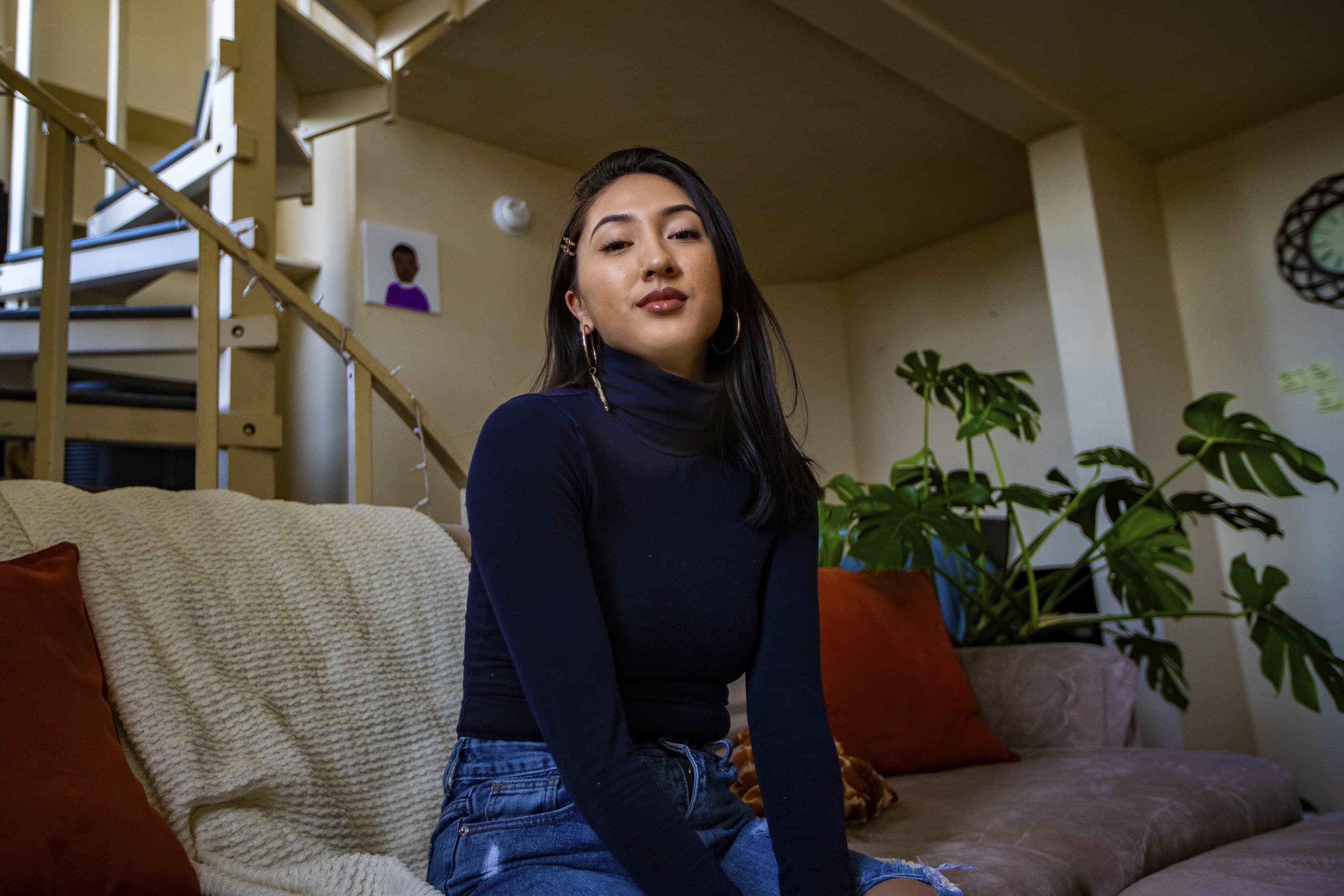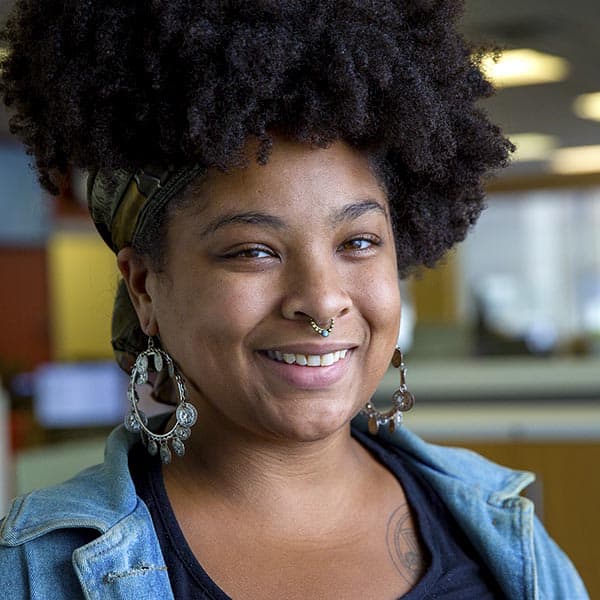Advertisement
The Creative Grind
'Damn, I Have No Money': Musician Sonni Mai On A Year Without Her Music

It has been one year since the pandemic began. In "The Creative Grind" series, ARTery reporters spoke to individual creatives to assess the financial and artistic impact of COVID-19, on a granular level, in the Boston area. First up — singer Sonni Mai.
Chelsea-based singer Sonni Mai remembers her last real gig before the COVID-19 pandemic lock down in February of last year.
"It was at Capone's in Peabody," she recalls in detail. "It was not as busy as it usually is — it was pretty dead. You know, sometimes we would get tips and stuff, but that night, we didn't get any tips."
It was a cash gig so Mai didn't really think to save the money she made that night. Usually, from April to December, Mai is booked nearly every weekend with a wedding gig. "I just remember thinking, 'Oh next week, I have another gig at The Burren anyways.'"
Except, she didn't. Soon after she sang at Capone's, states began to announce lockdowns and mandated quarantine periods. Like many, Mai remembers thinking that things would somehow get back to normal. But as the weeks passed, she quickly realized that her year, usually packed with gigs, was going to look quite different than what she planned.
Luckily, Mai had started a full-time job in 2019 as an office administrator at a technology consulting company. So she had a way to partially support herself after all of her gigs were canceled. "The majority of my income — the spending money, the saving money, being able to just afford life — came from the weddings and the bar gigs I was doing," she says.
With bars and venues closed and dance floors prohibited in Massachusetts, Mai only secured a handful of gigs in 2020. "I had a Fourth of July backyard party gig and maybe like five weddings," Mai explains. "But those weddings weren't in Massachusetts; they were in Maine, Vermont and New Hampshire."
Traveling across state lines for the few gigs she did have still put a strain on Mai's pockets — she had to spend the little money she saved on gas just to get to the venue. "I'm like 'damn, I have no money,'" Mai says with a good-natured laugh. "I need to save money to even feed myself. It was just so bad."
Advertisement
The Breakdown
On the phone at her apartment in Chelsea, Mai had just gotten off work and wonders if she should dip into her reserves to buy herself dinner for the night. "I'm literally about to take from my savings to order sushi," Mai admits, laughing. She doesn't usually order out — it's one of the things she's had to give up since the beginning of the pandemic.
It's increasingly hard for Mai to put aside any money to save right now or to even put toward treating herself or her friends and family. "Before coming home for this interview, I was thinking, 'damn, can I even afford to get a candle from TJ Maxx?'" She decided against the candle and opted to save it for the sushi instead. It's a small thing that Mai might not have thought too much about pre-pandemic, but now, it's a constant juggle between saving money and survival.
In 2019, when Mai was working regularly as a wedding singer and taking on bar gigs, she made a little over $17,000 before taxes. In that year alone, Mai estimates she worked around 50 to 60 weddings, making about $400 a wedding. It made up the majority of Mai's income and allowed her to save and pay for things, like furniture for her apartment or helping her mother out with expenses. But in 2020, she barely broke $2,000 from gigs — that's an estimated $15,000 in lost income, before taxes.
Like many living in the Greater Boston area, Mai's check from her full time job barely covers her cost of living. "Rent in Massachusetts, in Chelsea specifically, is not cheap," she says. "Most of my paycheck is going to rent." Her rent is $1,300 and her car, which she needs for both her job and her gigs, costs her about $600 a month for her car note and insurance. Because she's been partially working from home, her utility bills have gone up and now she shells out around $200 a month for electricity and gas. Because it's just her, Mai spends around $100 a month on groceries, unless she orders out, which is a rare occurrence.

Mai received the first $1,200 stimulus check and then another $600 check after that. But she works full time so she didn't qualify for the pandemic relief geared toward independent contractors, even though her gigs constituted a large part of her income. Boston artist relief efforts also proved fruitless. "I didn't qualify because I'm a Chelsea resident and it only allowed Boston residents," Mai recalls. "They denied me. I was so, so upset."
Despite living alone, Mai doesn't just have herself to look out for. Her mother, a Vietnamese immigrant who works as a nail technician, lost most of her income because of the pandemic. Anti-Asian sentiments fueled by the COVID-19 outbreak further impacted her mother's income. "People are so wary of getting their nails done by an Asian," says Mai. "The nail salon she did work at had to close [down]." Mai and her siblings use their income to help support their mother. "When you have immigrant parents who didn't grow up on the school system or who doesn't have a degree, who came from a whole other country, she just doesn't have that foundation to fall back on."
The Future
Mai picked up a second job in January as an Amazon Prime shopper at Whole Foods to help supplement her income. It pays $15 an hour and with a flexible schedule, it's the perfect side hustle for her. "It's helping a lot," she says. "I'm not going to lie, it's helping a whole lot." Between her two jobs, Mai estimates that she works around 70 hours or more a week, which doesn't leave much time or extra income for Mai to pursue her first love — music.
"I don't have money to pay for studio time," she points out. "But then, also I don't have money to pay for the beat, you know what I mean? Or for a music video — I can't really do any of that right now."
One good thing the pandemic has taught Mai is how to be more self sufficient when it comes to her artistry. "I'm teaching myself Adobe Premiere Pro and I am going to learn how to edit these videos and do all this myself," she says. But if it was up to her, she wouldn't necessarily choose to do so. "I had no choice because I'm broke. I'm not gonna ask another creative for free stuff."
Gov. Charlie Baker announced that the state would open up “concert halls, theaters and indoor performance spaces” with a 50% capacity and a 500-person limit on March 1. Boston Mayor Marty Walsh pushed that date back to March 22 for the city. Mai welcomes the news but is still wary about the future.
Right now, she has one wedding gig lined up for April and hopes to book more as the year progresses. She's continuing to make music and dropped her most recent project, "To The Sun & Back," in February. Mai has a positive outlook on what can happen this year but is still preparing for the worst case scenario. "Anything could happen you know? Anything. I just really need those gigs back."
This segment aired on March 10, 2021.
